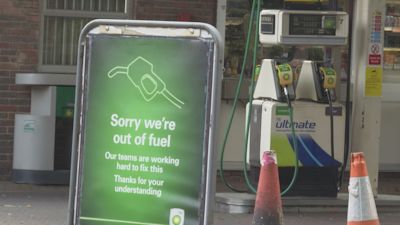Was the media to blame for the fuel panic-buying crisis?

A YouGov poll has revealed that roughly 47% of people believe the recent fuel shortages have been caused by the media.
The poll, which was conducted on Tuesday 28 September, asked: "Who do you think is to blame for petrol stations running out of fuel?"
The results of this informal poll are, of course, not scientific but they do give an indication of the strength of feeling among the general public.
A brief search of social media sites like Twitter and Facebook show thousands of posts that to some lesser or greater degree blame the media for causing the panic-buying.
"Media are the problem", one Twitter user called James wrote. "By reporting on "shortages" and places running out of petrol, it enables people to think they need to queue at pumps. It's all unnecessary. Media's fault".
This Twitter user's view - that by showing people panic-buying you encourage others to do the same - is a common one. Similar accusations were directed at the media during the pandemic when stocks of toilet roll ran low.
But can 'the media' really be held accountable for these events?
"I think the crisis was there for people to see and ordinary people are sharing images of these queues on social media", Professor Karin Wahl-Jorgensen from Cardiff University told me.
"So I don't think this crisis is fabricated by the media. Equally I think it's important to reflect on how media organisations choose to cover it, what kind of elements they choose to amplify and emphasise and what which part of the story are maybe not told in quite so much detail".
Some of Professor Wahl-Jorgensen's previous research has looked at the links between citizenship, the media and emotion. During the pandemic she spoke about the importance of language used by media organisations and the impact it can have on the behaviour of individuals.
"In the case of a crisis like this one", Professor Wahl-Jorgensen continued, "the media really have to weigh their responsibility around the extent to which they cover such a story, and also the way in which that story is covered, against the risk of excessive or sensationalist coverage".
A large number of people in Wales get most of their news and information from social media, where there are generally few rules on what people can publish.
At the same time, commercial media organisations have to stick to strict guidelines on balanced and public service news provision.
"We're operating in a very complex media ecosystem", Professor Wahl-Jorgensen says, "where you have a variety of different news organisations, you also have any growing role of social media, and then you have all sorts of different kinds of actors who may be sharing misinformation or based sensationalist information, sometimes for very good reasons and other times for more kind of harmful reasons.
"I think that also means that traditional news media, which report on stories in a responsible manner, are more important than they ever have been".
"I do think that there are significant parallels with the great loo roll crisis of 2020", the Professor told me.
"We saw widespread reporting on empty shelves and we saw widespread sharing of such images on social media. Then there was subsequent bulk buying by pretty much everyone in the world.
"I'm not sure that we have learned a lot", she continued.
"I think that the language that's being used to describe crises and the way in which these messages are amplified from repetition that these are some of the things that media organisations can look out for.
"I do acknowledge this is an incredibly thorny issue, and journalists like everyone else, have had a lot to learn over the past 18 months about how to actually manage a crisis and how that changes your ways of working.
"And in the case of news organisations, how the crisis changes the ways of reporting as well."